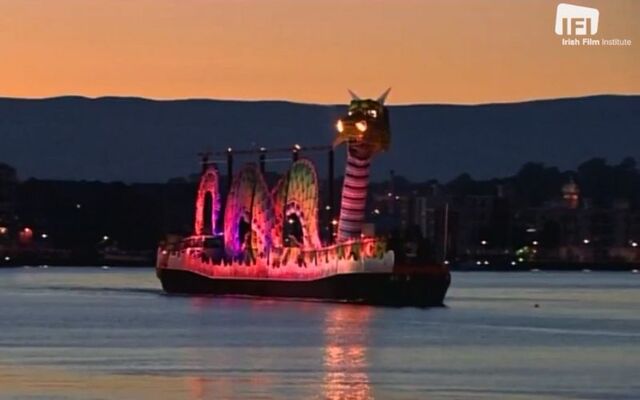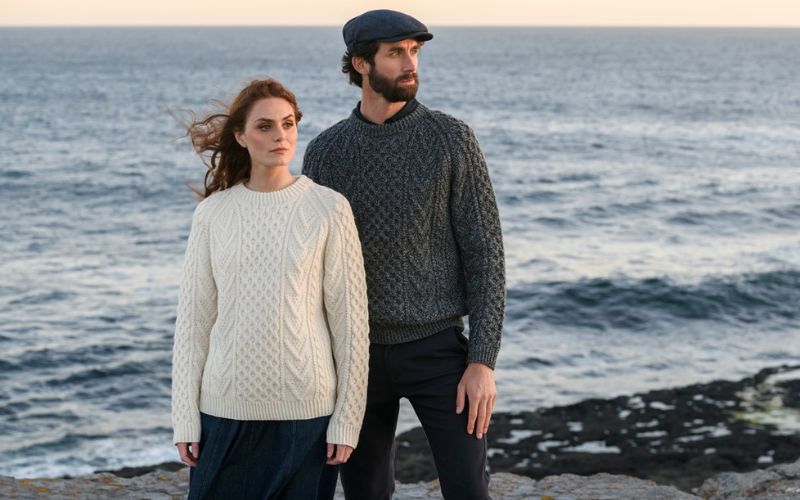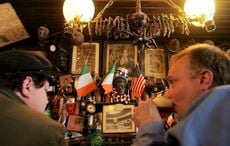In this film now available to stream via the Irish Film Institute's Archive Player, director Margo Harkin uncovers the inside story of one of the highlights of Derry's UK City of Culture programme in 2013.
The spectacle of The Return of Colmcille on the River Foyle in the summer of 2013 was the brainchild of writer Frank Cottrell Boyce, who delivered the stand-out moment of Derry's year as the UK City of Culture.
In a magical reworking of the story of St. Columba, the story began on the Isle of Iona several weeks beforehand when the small community of 14 children created the gift of a book which was ferried across the Irish Sea by a 12-man currach, making the reverse journey that Derry’s patron saint travelled 1,500 years before. In a surprise, mythical twist, the Lough Ness monster plans a showdown.
The excitement and sense of wonder by the thousands who lined the banks of the river was the culmination of two days of colour, sound, dance, and music which engulfed the whole city, reaching a pyrotechnic climax as the Loch Ness monster sailed up the river to confront his nemesis, St Columba, once again.
"The Return of Colmcille" is part of the Margo Harkin: Radical Witness collection on the IFI Archive Player.
The Irish Film Institute's Margo Harkin: Radical Witness Collection
Margo Harkin is one of Ireland’s most versatile and respected filmmakers, having directed and produced fiction and documentary films for over 40 years. Her work includes an invaluable chronicle of Northern Ireland’s recent political history.
After graduating in Fine Art from the Ulster College of Art and Design in 1974, Harkin worked as an art teacher and community worker in socially deprived areas of Derry. She joined Field Day Theatre Company in 1980 as an Assistant Stage Manager on Brian Friel’s Translations, before going on to work as a stage designer for the company.
In 1984, Harkin co-founded Derry Film & Video Workshop with Anne Crilly and Trisha Ziff, delivering critical perspectives that ran counter to the censored narratives then broadcast by British and Irish television. The signal works of this period were "Mother Ireland" (1988), Anne Crilly’s controversial documentary about feminism and Irish republicanism, and Harkin’s own "Hush-A-Bye Baby" (1990), a feature drama about teenage pregnancy following the 1983 abortion referendum in Ireland.
Harkin established Besom Productions in 1992, making educational films for Channel Four, but her reputation as an astute, local documentarian of injustices was soon forged through a series of highly-regarded television documentaries. Her cinema films, the surf documentary Waveriders by Joel Conroy (which she produced) and Stolen, about the plight of unmarried mothers in Ireland in the 20th century, provided thoroughly researched, compelling accounts of their subjects.
Margo Harkin is a member of Aosdána. Her work has won countless awards and is widely taught to third-level film and media students.
All titles in this collection were digitised and preserved by the IFI Irish Film Archive thanks to a grant from Coimisiún na Meán’s Archiving Funding Scheme, which aims to preserve content recorded for broadcast on radio or television.
"The Return of Colmcille" is published here thanks to the Irish Film Institute (IFI), who IrishCentral has partnered up with to bring you a taste of what their remarkable collection entails. You can find all IrishCentral articles and videos from the IFI here.
To watch more historic Irish footage, visit the IFI Archive Player, the Irish Film Institute’s virtual viewing room that provides audiences around the globe free, instant access to Irish heritage preserved in the IFI Irish Film Archive. Irish Culture from the last century is reflected through documentaries, animation, adverts, amateur footage, feature films, and much more. You can also download the IFI Archive Player App for free on iPhone, Android, Apple TV, Amazon Fire TV, and Roku.
IrishCentral has partnered up with the IFI to bring you a taste of what their remarkable collections entail. You can find all IrishCentral articles and videos from the IFI here.



